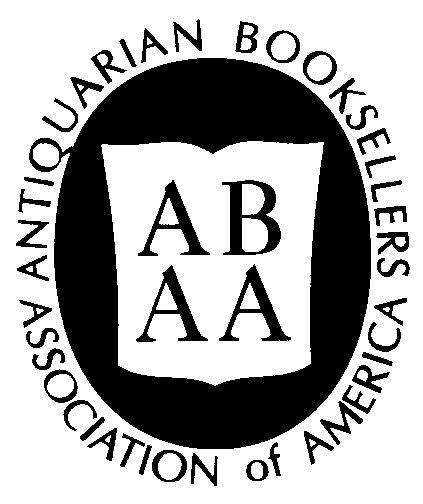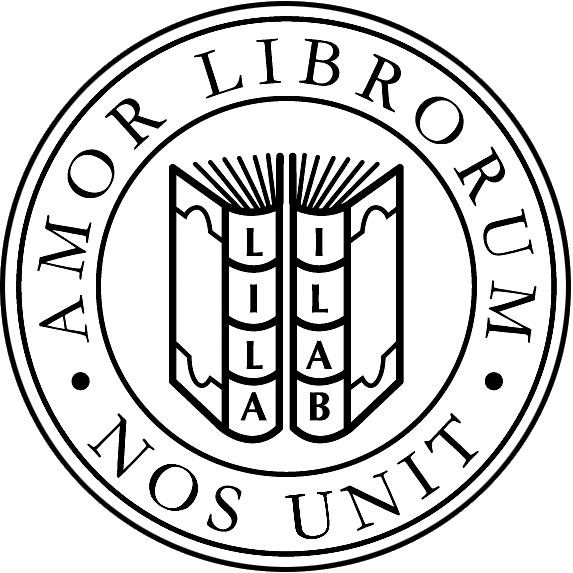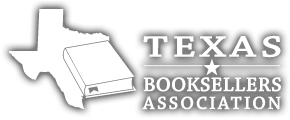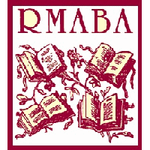Dealer in Rare and First-Edition Books: Western Americana; Mystery, Detective, and Espionage Fiction
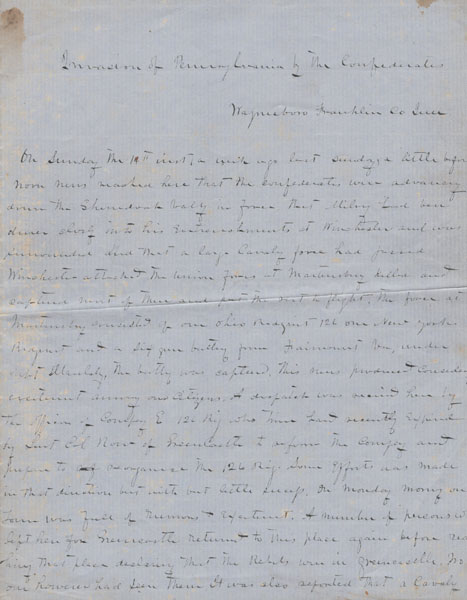
Invasion Of Pennsylvania By The Confederates (Manuscript Title)
Publication: Privately written, 1863, Waynesboro, Pennsylvania
A fascinating eyewitness account written by an unnamed resident of the town of Waynesboro, Pa., concerning Confederate troop activity in Pennsylvania near the Maryland border in the days leading up to the Battle of Gettysburg. Though undated, the manuscript, according to the writer, was composed, or at least started, on June 30. It is not clear if the manuscript was written over several days, and completed at a later date. Notably, there is no mention of the Battle of Gettysburg, which ran from July 1-3. The author was also not aware that Hooker was no longer in command of the Army of the Potomac and that he had been replaced by General George G. Meade on June 28. The account begins with reference to the Second Battle of Winchester, Va., which occurred on June 13-15, 1863, and resulted in a Confederate victory under Lieutenant General Richard S. Ewell, and was followed by Ewell's advance into Pennsylvania. Confederate forces also captured the town of Martinsburg, W.V. The account reads, in part: "On Sunday the 14th...news reached here that Confederates were advancing down the Shenandoah Valley in force that [Union Major General Robert H.] Milroy had been driven closely into his entrenchments at Winchester and was surrounded and that a large Cavalry force had passed Winchester, attacked the Union forces at Martinsburg, killed and captured most of them and put the rest to flight. The force at Martinsburg consisted of one Ohio Regiment 126 one New York Regiment and a six gun battery from Fairmount Va. under Capt. [Colonel William P.?] Maulsby. The battery was captured. This news produced considerable excitement among our citizens. A dispatch was received here by the officers of Company E 126 [Pennsylvania] Reg. who[se] time had recently expired...to reform the Company and prepare to reorganize the 126 Reg. Some effort was made in that direction but with little success. On Monday morning our town was full of rumors & excitement. A number of persons who left here for Greencastle returned to this place again before reaching that place declaring that the Rebels were in Greencastle. No one however had seen them. It was also reported that a Cavalry fight had occurred between Capt. Fiery [William Firey] & the Confederate force between Hagerstown & Clearspring [Clear Spring] in which Capt. Fiery was reported killed (some accounts say wounded & prisoner). This fight occurred on Sunday the 14th. On Monday the 15th marched on to Chambersburg and arrived there about 11 oclock at night under the command of Gen. A.G. Jenkins with a force reported to be about 1500." In this last sentence, the author refers to Confederate Brigadier General Albert Gallatin Jenkins, who, two weeks prior to General Robert E. Lee's arrival in Pennsylvania, led a weeklong Confederate raid into southern Pennsylvania. Jenkins stole horses and cattle, as well as destroyed a number of farms. During this time Jenkins' force captured Chambersburg. He soon fled, however, when he received word of an advancing Union force. Within days of leaving, Jenkins returned, along with several Confederate divisions. They appropriated vast amounts of provisions, but leaving Chambersburg intact when they departed. After mentioning Jenkins' capture of Chambersburg, the author returns to describing events in Waynesboro and Greencastle: "On Tuesday morning some of The Whiskey patriots of our town visited Greencastle and assisted in arresting three stragglers and brought them to this place, later in the day four couriers were arrested. On the arrival of these prisoners a hearty cheer was given by the unthinking part of our citizens. The more reflective portion of our people seemed to fear that mischief might grow out of these arrests. About 9 oclock on Tuesday night Maj. [D. Watson] Rowe...arrived here and stated that a Squadron of Cavalry had returned to that place from Chambersburg demanding the return of all the prisoners with their horses & guns declaring that they meant to hold Greencastle & Waynesboro. This news produced intense excitement among our citizens. Their arrest under the circumstances was freely discussed and denounced by our respectable citizens. The fact too that our town was under the control & influence of a set of Whiskey Suckers was also freely admitted & denounced.... Arrangements were made and four of them were sent back that night, and a pledge given that the balance should be sent if possible the next day." The taking of Confederate prisoners came with a price, as Greencastle and Waynesboro came under a threat of Confederate retaliation by Tuesday and Wednesday. The author continues: "In the afternoon about thirty soldiers rode into Greencastle and read an order from Gen. Jenkins demanding the return of their prisoners' horses and property by four oclock that evening or they would burn down the town. This order it is said produced the most intense excitement there. Parties from here having heard this order read returned to this place and gave this information. Many persons here believing that this order would be executed and that Waynesboro would share the same fate became much alarmed. This alarm became very general and the result was one night of much excitement. The night passed however and no rebels made their appearance. On Wednesday...we received word that four rebels were at Marsh River, capturing horses and stated that they would be in Waynesboro on the following day. At this time many rumors were afloat in regard to the approach of the Rebels. Time and again it was rumored that they were coming. The excitement began to run at fever heat. Finally the cry was raised at the west end of town that the Rebels were coming and would be in a few minutes. For a moment all was excitement. The women began to run & scream the children to cry and the men of business to slam their doors & windows shut & all was confusion and excitement for this time but it was soon found that all were more scared than hurt. No Rebels came. The farmers were all busy endeavoring to save their horses. Nearly all seemed to look for safety in the mountains....In the early part of the week the news prevailed through the county that Gen. Jenkins' men were capturing all the horses they could find. Such news became very unpleasant to those who had horses - especially the farmers." By Friday, June 19, Confederate forces arrived and encamped near Waynesboro. The author of the manuscript recounts his meeting with Confederate officers and the interactions between the rebel soldiers and the citizens of the town: "About five oclock in the evening a squad of Confederate Cavalry made their appearance in town...representing themselves to be the advance guard of Gen. A.P. Hill's Corps. Many persons appeared to doubt the truth of their statement. Not very long however and Gen. [Henry] Heth Commander of the division made his appearance, ordered the stores to be spared and that the citizens furnished [blank] lbs of bread by 6 oclock in the morning. A number of our citizens at once canvassed the town and got the amount subscribed....The conduct of the troops in passing through town was very good but the bitterness of those that had the opportunity to talk to our citizens against the North was most intense. Many of them seemed to thirst for revenge. Almost every one told the same story of the wanton destruction of their homes or the homes of their parents. Many seemed anxious to retaliate in the same manner ....The capture of hats was practiced by swapping by the Rebs. It was very common occurrence to see them step up to a citizen and seize his hat and give him his old one in return. This was done sometimes with the utmost coolness at other times they seemed to regard it as a good piece of fun. The number of troops in these two divisions were estimated by different persons at from 15 to 20,000. About 18,000 would likely be about correct. The Confederates were frequent in their inquiries as to who would meet them. The idea that they would be met with militia seemed quite amusing. They insisted that they could whip all the militia that could possibly be brought before them. They also insisted that when they did fight it would be against Hooker's Army (in which opinion this writer fully concurs). The troops passing through here on Saturday entered the stores and took a large quantity of goods paying in Confederate money. Many things was taken up by the privates and not paid for. The army moved on to Fayetteville and there encamped for the night & is said to be there at the present writing June 30." The conclusion of the account addresses rumors concerning the advance of Gen. Lee's Army of Northern Virginia toward the Harrisburg and Chambersburg areas: "During the day a report reached here through a deserter from the Union Army that Hooker's forces were between Frederick City, Md. and Boonsboro, that Lee had got an army in his rear and was advancing on Baltimore and that Hooker had turned his forces and was following him up. The fact that the Rebel forces in Pa still remaining on the Pike from Chambersburg to Gettysburg made this story look plausible: that they would advance on Hooker & bring him between the two Rebel forces, seize the North Central road & cut off all [?] from Harrisburg....Mr. McCausland arrived this evening from Chambersburg and states that Gen. Lee is in Chambersburg & that a very long train heavy loaded with heavy guard of infantry & artillery left Chambersburg in the direction of Hagerstown. Mr. Mc. gave it as the opinion at C[hambersburg] that they were moving off their superfluous plunder and were about to prepare to march towards Baltimore. A report reached here today that the Cavalry force that crossed the mountains yesterday evening met a force of infantry at Millerstown and were driven back. We have no news from a distance; no mails, nothing but rumors and not one in ten that may be correct." A fascinating look at how one resident of a Pennsylvania town near Gettysburg responded to and interpreted events leading up to that epic engagement. A typed transcription of the letter is included.
Inventory Number: 45021Sold -- Contact us





